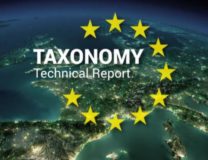The EU Technical Expert Group on Sustainable Finance (TEG), established to advise the European Commission on implementation of the Action Plan on Financing Sustainable Growth, believes the Sustainable Taxonomy, EU Green Bond Standard, and Paris-Aligned and Climate Transition Benchmarks, can guide public and private sector plans for recovery from the Covid-19 pandemic, including the European Council’s recently announced Roadmap to Recovery.
Background
We are in a time of unprecedented crisis. While governments, public institutions and the private sector focus urgently on protecting health, incomes and businesses, we are reminded that building capacity and resilience in our social and economic systems is what provides the best protections in moments of crisis. Our scientists have warned us that loss of biodiversity and disease outbreak are closely related. They also warned us to expect a volatile climate as a result of human contribution to climate change. If global temperatures warm above 1.5-degrees Celsius, we face catastrophic risks and disruption, both from inevitable measures to rapidly cut emissions in our economy and from the impact of changes in the natural environment on our health and well-being.
As we prepare plans for economic recovery from the Covid-19 pandemic, governments and the private sector must be attentive to the details of what a resilient, sustainable and fair recovery looks like in practice – to ensure greater resilience to further environmental and social crises ahead.
Clear policy priorities
The Members of the European Council identified the central role of the Green Deal in its Roadmap for Recovery from the Covid-19 pandemic. The Green Deal includes 2050 climate neutrality and a pending 2030 climate goal. These climate goals must be used to calibrate recovery responses.
Recovery plans should not support environmentally or socially harmful activities, which would worsen the current and future crises, locking in highly polluting infrastructure or promoting activities that do not contribute to social wellbeing for decades to come.
Role of the private sector
The private sector has a clear role in ensuing access to finance in a sustainable recovery. Corporate and investor strategies that only maintain existing approaches and environmental performance levels and do not clearly align with environmental objectives are accumulating financial risk and contributing to a future climate related social disruption. Private sector plans must be transparent and clear on their alignment with the environmental and social objectives to increase the effective targeting of public recovery measures.
The right tools for the job
The TEG was established to provide expertise on new tools to finance a sustainable future. Now that decisions must be made on recovery policies, we consider it essential to use the right tools for the job. The TEG has developed three tools that can guide both government and private sector plans right away: The Sustainable Taxonomy, the Green Bonds Standard and the Paris-Aligned and Climate Transition Benchmarks. These tools encourage substantial contributions to environmental and social objectives, including by companies and financial actors with which are not fully aligned with environmental goals today.
The Sustainable Taxonomy provides a framework for future recovery measures. It shows the environmental performance and minimum social standards that are necessary for economic activities to reach our climate and environmental goals, including climate neutrality by 2050 and ambitious 2030 targets. The Taxonomy is particularly relevant for new investments, that are needed to transition our economy, showing how and where to cut carbon emissions, build climateresilience, optimise supply chains towards sustainability and to stimulate jobs.
The Green Bond Standard (GBS) presents a best practice model, the elements of which can be applied by all bond issuers to explain how their funding contributes to the wider sustainability strategy and resulting environmental and social impacts of the issuer. The framework of the GBS can also be applied to increase transparency of social impact and outcomes of finance.
The Paris-Aligned and Climate Transition Benchmarks are tools to support allocation of a large amount of private capital towards climate transition. They do so by aligning investors’ portfolio selection with climate change objectives, particularly the IPCC’s 1.5-degree Celsius trajectory.
The time to work is now
This Covid-19 crisis is not the last we will face. The prognosis of our scientists teaches us that our climate goals are critical to reducing the risk of catastrophic crises in the future. The TEG stands ready to work with the European Commission for the remainder of its mandate, providing guidance on the implementation of tools by both public and private sectors to enable finance to play its full role in a sustainable recovery.
The opportunity for a resilient, sustainable and fair economic recovery is right before us. We encourage all governments, public institutions and the private sector to use the right tools for the job and to take it.




